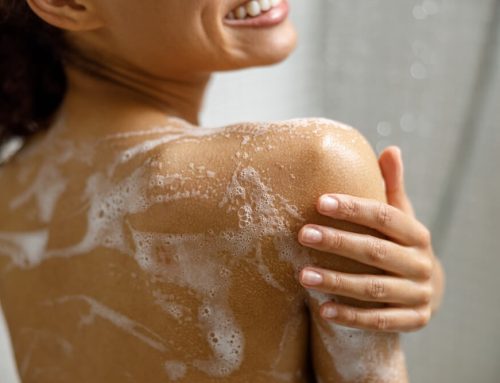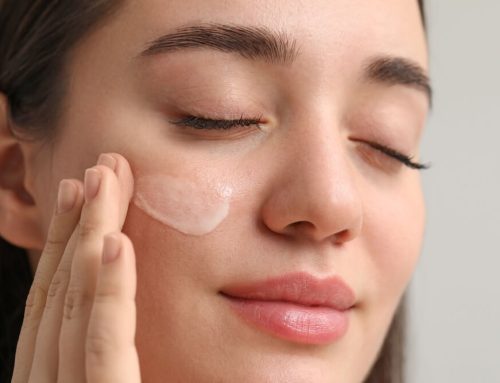Whether you love it or hate it, your skin struggles to stay in shape each winter. Dealing with bitter winds, snow and ice, and dry indoor heating systems can really take its toll, leaving your skin looking dry, rough, and dull.
Don’t worry, it doesn’t need to be this way! Here are 13 expert cold-weather skin care tips to keep your skin looking its very best throughout the season.
Find the Perfect Winter Moisturizer for Your Skin

You’ll often see recommendations for thick and greasy winter moisturizers, but these won’t suit everyone – it all depends on your skin type.
Yes, those who have very dry and sensitive skin in the winter will see improvements when switching to a richer moisturizer, but this can lead to problems for those with oily skin types.
Of course, there are certain winter ingredients that everyone should be making the most of, no matter their skin type, such as:
- Hyaluronic acid
- Ceramides
- Fatty acids
- Antioxidant-rich botanical extracts
It can sometimes take a bit of trial and error to work out which moisturizer suits your skin the best during the winter. However, the effort will be more than worthwhile once you begin to see the improvements in your skin.
Turn Down the Indoor Heating
It may be second nature to hit the switch on your indoor heating system throughout the winter months, but try to avoid this as much as possible.
Why?
Because heated indoor air is extremely dry. This then causes the moisture in your skin to evaporate out at a much faster rate, leaving it dry and dehydrated.
It’s understandable that you won’t be able to completely turn off your indoor heating system. However, whenever possible, try to opt for an extra layer of clothing instead of cranking up the heat.
Invest in a Humidifier
Can’t live without your indoor heating in the winter?
Fair enough!
In that case, consider investing in a good humidifier instead. This can really be a huge game-changer for your skin.
How?
Well, a humidifier is designed to add moisture back into the air. This then means transepidermal water loss, which is the rate at which moisture evaporates out of your skin, is slowed down, keeping your skin better hydrated.
Set your new humidifier at 60% if you really want both your skin and hair to benefit. If this is slightly too high for you, then turn it down a bit – anything above 30% would still be a big bonus!
Avoid Long, Hot Showers

Just like when it comes to turning up the indoor heating, many love to languish under a hot stream of water in the winter months. After all, this is such an enjoyable way to warm up, especially after a long and cold day!
Unfortunately, this again isn’t doing your skin any favors…
Hot water strips away your skin’s natural oils, leaving it vulnerable to dryness and sensitivities.
Ideally, try to keep your showers as cool as you can handle – lukewarm is perfect. Try to also limit the amount of time you spend in the shower – seven minutes is a good starting point!
Moisturize Damp Skin
Dryness is a problem that many face in the winter months, but here’s an easy tip to avoid that…
Each time you’re done showering, you should be moisturizing. However, don’t wait until you have rubbed your body dry with a towel before applying your moisturizer.
Instead, give your body a quick pat down and then apply your body cream while your skin is still damp.
Why?
Because although a moisturizer does help to add extra moisture back into your skin, its main purpose is to form a protective layer over the surface of your skin, preventing any existing moisture from evaporating out.
Doing this when your skin is already damp means that all of those extra water molecules then get trapped into your skin, which significantly increases your skin’s moisture content.
Do this with both your body and your face – you’ll notice a difference pretty quickly!
Cut Back on Exfoliation
How often do you exfoliate in the winter months?
You may be tempted to ramp things up a bit in the exfoliation department as a way to slough off all of that rough and dry skin, but this will only make things worse.
Your skin is already extra sensitive in the winter, and exfoliating will make it even more so.
Yes, exfoliating has its benefits, but it also removes that outermost layer of protective skin cells from the surface of your skin, leaving it vulnerable.
How often should you be exfoliating in the winter?
No more than once a week if your skin type is dry or sensitive. You should also be using a very gentle chemical exfoliant, rather than an abrasive scrub.
Those with other skin types may be able to get away with exfoliating twice a week, but don’t be tempted to overdo it.
Eat Seasonally

People usually think of the warmer months when seasonal eating is mentioned. After all, surely there aren’t many foods that are seasonal in the winter?
This is where you would be wrong…
Not only does the winter produce a surprisingly bountiful harvest, but seasonal winter foods also contain all of the vitamins and antioxidants your skin needs to see it through the colder months.
Wondering which foods are in season in the winter?
That depends on where in the world you live, but a few options include:
- Pumpkins and squashes
- Pomegranates
- Brussel sprouts, kale and cabbage
- Apples
- Onions and leeks
- Parsnips and carrots
- Artichokes
- Lemons
Try incorporating as wide a variety of seasonal foods into your meals as possible. This will ensure that your skin, as well as the rest of your body, receives a good selection of nutrients.
Avoid Harsh Skin Care Products
Just like how exfoliating leaves your skin vulnerable, harsh skin care products do the same.
Anything containing heavy fragrances and alcohols should be avoided during the winter months. You’ll often find these in cleansers and toners, with these being common causes of winter dryness.
Swap these out for gentle, soothing alternatives instead.
Establish a Solid Nighttime Skin Care Routine
Do you have a skin care routine that you can easily follow each and every night?
If your answer is no, now is the time to create one.
What should your nighttime skin care routine consist of in the winter?
Here’s a basic winter night skin care routine to follow:
- Start with a gentle cleanser, such as the Lionesse White Pearl Facial Cleanser
- Follow up with a hydrating, alcohol-free toner
- Apply a serum, such as the Black Onyx Serum from Lionesse
- Dab on an eye cream
- Finish with a rich moisturizer
- If your skin is especially dry, a final layer of a plant-based facial oil would be beneficial
The exact products that you use should depend on your skin type, as well as the specific skin concerns you’re trying to treat.
Make Sure You’re Getting Enough Beauty Sleep

There’s no point establishing a solid nighttime skin care routine if you aren’t getting good sleep at nights.
Yes, you may be giving your skin the ingredients it needs to carry out all of those important nighttime processes, but it’s only able to do those things if you are asleep.
Both quantity and quality matter equally when it comes to sleep. Around 8 hours of sleep each night is ideal, and this should be good quality sleep, meaning that you don’t continuously wake up throughout the night.
If you know that there’s room for improvement when it comes to how you sleep at night, here are a few tips:
- Don’t use electronic devices for a couple of hours before bedtime
- Avoid heavy meals before bed
- Make your bedroom a sleep-inducing haven with dim lighting, soft music, and the perfect ambient temperature
- Sip a cup of chamomile tea before heading to your bed
Don’t Forget About Sunscreen
Think you don’t need to be using a sunscreen in the winter?
Think again…
UV rays remain constant year-round. In fact, they can sometimes be even stronger in the winter, due to the way in which they are reflected by snow and ice.
The fact that so many people think that they don’t need to use a sunscreen in the winter means that a large amount of skin damage happens during the colder months. If you aren’t already aware, UV rays commonly:
- Cause fine lines and wrinkles
- Cause dark spots to appear on your skin
- Leave your skin with a rough and leathery texture
- Reduce your skin’s elasticity
- Cause skin cancer
UV rays penetrate through thick cloud, and even glass, meaning that you’re never really safe, no matter the time of year or what you may be doing.
This makes sunscreen a must in the winter. SPF 30 is usually sufficient, unless your skin happens to be on the sensitive side.
Don’t forget that you will need to keep reapplying your sunscreen throughout the day. You may not need to do this as much as you do in the summer, since you’ll probably be sweating and swimming less, but reapplication is still a must every few hours.
Looking for a new sunscreen product?
Try the Lionesse Opal Sheer Shield – it’s a moisturizer that contains SPF30 for both UVA and UVB sun protection.
Wear Comfortable, Layered Clothing
Heavier fabrics tend to be worn more often in the winter, but these can often feel irritating on the skin.
Materials such as wool are a prime culprit. They may work fantastically at keeping you warm, but they will also leave your skin feeling itchy and dry.
Fortunately, this is a simple problem to avoid…
All you need to do is layer your outfit, keeping the softer and lighter garments close to your skin. Then, pull any thick and wooly layers over the top, so that they aren’t actually touching your skin at all.
Wondering how you can get away with this when it comes to wool gloves?
It’s simple – slip on a pair of silk or cotton glove liners first. Then, pull your wooly gloves over the top. Not only will this keep your skin comfortable, but it will also give you a little extra insulation against the cold.
Stay Hydrated
It’s much easier to remember to drink your eight glasses of water a day in the summer, since the heat will make you feel thirstier.
However, it’s important to pay attention to how much water you’re drinking in the winter too…
Your body needs to keep hydrated in order to function properly, and this also applies to your skin cells. While you can increase moisture externally by using topical skin care products, these don’t usually penetrate into the deepest layers of your skin, even though water is needed here too.
The only way to hydrate those deep skin cells is by keeping your whole body hydrated.
Granted, you may not want to down multiple glasses of cold water in the winter, but there are other ways to stay on top of your fluid intake. Teas are a great alternative, especially if you go for an antioxidant-rich herbal blend.
Fresh juices work well too, but keep in mind that these can often be high in sugar, so moderation is key.
Winter can really play havoc on your skin, leaving a large number of people dealing with frustrating skin problems in the colder months. Fortunately, much of this can be avoided by tailoring your skincare routine, as well as your lifestyle, in a way that keeps your skin protected, safe, and healthy.









Leave A Comment